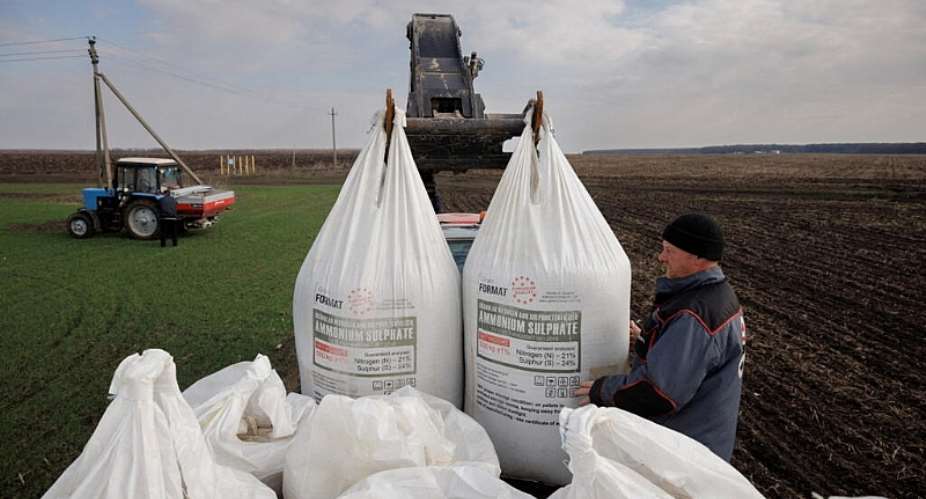French imports of fertiliser from Russia have shot up during the country's war with Ukraine – leading to doubts over the government's promise to ensure that France is able to satisfy its own agricultural needs.
Between 60 and 70 percent of fertilisers used on French farms have traditionally come from abroad.
In 2021, 442,000 tonnes of fertiliser was brought in from Russia.
But in 2023, a year after President Vladimir Putin ordered his troops into Ukraine, 725,000 tonnes were imported.
Jean-Luc Bourgeaux, MP for Ille-et-Vilaine, raised his fears over the increase with the Ministry of Agriculture ahead of the International Agriculture Fair in February.
To offset possible criticism, French Prime Minister Gabriel Attal outlined a package of measures aimed at reassuring farmers that agriculture remained a top priority for President Emmanuel Macron's administration.
"France must be sovereign," Attal said at a press conference. "Agricultural sovereignty is our course."
Flanked by Economy Minister Bruno Le Maire, Agriculture Minister Marc Fesneau and Christophe Béchu – who holds the Ecological Transition portfolio – Attal added: "We want to place agriculture among the nation's fundamental interests in the same way as our defence or our security. I would remind you that there can be no country without farmers."
Ongoing dependence
But despite bold statements of self-sufficiency, dependence on foreign governments has been continuing.
In February, Leo Alders, boss of the mineral fertiliser manufacturers group Fertilisers Europe, told the European news website Euractiv that each country within the European Union had to concentrate on making its own fertilisers.
"If Europe is to ensure food sovereignty, it must maintain resilient domestic production chains with a minimised dependency on imports," Alders said.
"Since the war in the Ukraine, the surge in fertiliser imports from Russia has weakened the EU's food security. One reason is that the fertiliser sector is a high energy consumer.”
Nicolas Broutin, chairman of Yara France, a Norwegian group specialising in fertilisers, echoed Alders' anxieties.
He told Ouest France newspaper: "Fertiliser is the weak point in France's food sovereignty."
"The Russians are slashing prices because they have the cheapest gas on the planet and you need gas to make fertiliser."
In the United States, Tony Will, the boss of CF Industries, a global manufacturer of hydrogen and nitrogen products, highlighted the paradox facing countries.
"What is shocking is that we have tried not to finance the Russian war machine and not to buy Russian gas," he told Reuters news agency.
"Yet the United States is prepared to accept urea and ammonium nitrate from Russia, which is in fact nothing more than natural gas converted into fertiliser."





 Election 2024: Govt illegally recruiting NPP footsoldiers into security services...
Election 2024: Govt illegally recruiting NPP footsoldiers into security services...
 Presidential convoy accident: Full list of injured victims
Presidential convoy accident: Full list of injured victims
 NIA to register children from age 6 to 14 from June 10
NIA to register children from age 6 to 14 from June 10
 Hon Joewise, Rafeal Opoku Adusei set aside differences, unite for 2024 victory i...
Hon Joewise, Rafeal Opoku Adusei set aside differences, unite for 2024 victory i...
 Voter registration: Election Watch Ghana accuse EC of using stolen BVRs to regis...
Voter registration: Election Watch Ghana accuse EC of using stolen BVRs to regis...
 Medikal's predicament is a typical example of why men must fear buttocks – Ste...
Medikal's predicament is a typical example of why men must fear buttocks – Ste...
 Payroll audit: GHS2.8 million found being paid to ‘ghost names’ in Northern regi...
Payroll audit: GHS2.8 million found being paid to ‘ghost names’ in Northern regi...
 Payroll audit: Non-existent school had staff who were being paid in Northern reg...
Payroll audit: Non-existent school had staff who were being paid in Northern reg...
 OSP, CAGD identifies, clears ‘ghost names’ on government payroll; saves Ghana ov...
OSP, CAGD identifies, clears ‘ghost names’ on government payroll; saves Ghana ov...
 Dr. Sam Ankrah urges Electoral Commission to address registration issues and pro...
Dr. Sam Ankrah urges Electoral Commission to address registration issues and pro...
